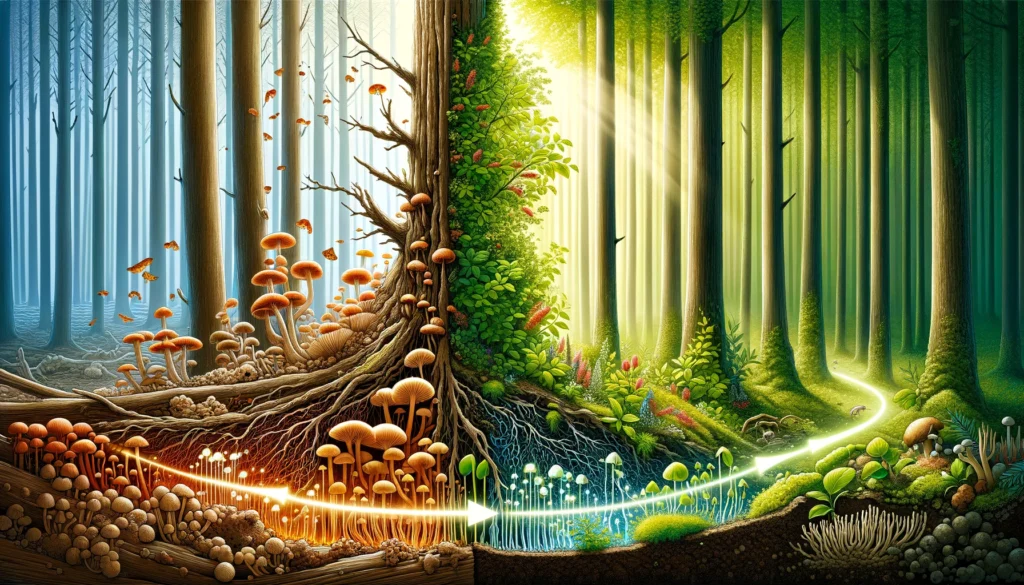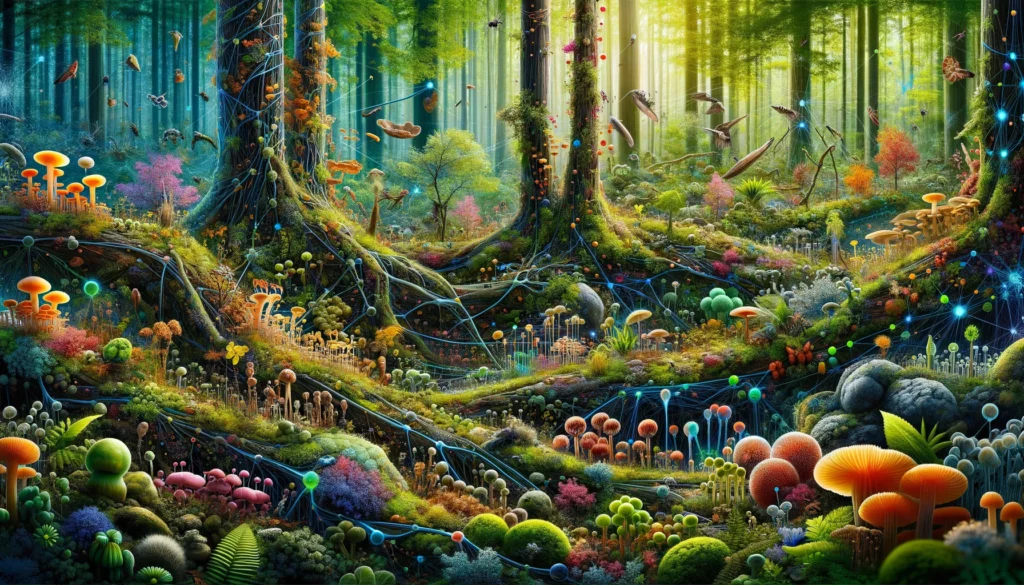Welcome to the final blog of our series – “Fungi: Earth’s Hidden Climate Heroes“
As we conclude our series on the pivotal roles fungi play in combating climate change, it’s clear that these microscopic organisms are much more than meets the eye. Fungi, the unsung heroes of the natural world, are integral to maintaining the balance of ecosystems and offer innovative solutions for climate mitigation. Through their interactions with plants, soil, and the atmosphere, fungi demonstrate their incredible ability to support life on Earth in the face of environmental challenges.
The Fungal Impact
The impact of fungi on our planet stretches far and wide, touching every aspect of the natural world in profound and often unseen ways. These organisms, which constitute their kingdom of life, are not just participants in the ecological ballet; they are choreographers, shaping the environment, supporting life, and offering solutions to some of the most urgent environmental issues confronting us today. Let’s delve into the multifaceted roles fungi play and their overarching impact on the Earth’s ecosystems and climate.

- Ecosystem Engineers
Fungi are nature’s ultimate recyclers, breaking down dead and decaying material and turning it into nutrient-rich soil that can support new life. This process of decomposition is vital for the health of our ecosystems, ensuring that nutrients are cycled efficiently and that no energy is wasted. But fungi’s role as ecosystem engineers doesn’t stop at decomposition. Through their symbiotic relationships with plants, fungi enhance the growth and resilience of their hosts, helping to sustain and expand the world’s forests, grasslands, and other vital habitats.
- Guardians of Biodiversity
Biodiversity is the lifeblood of our planet, and fungi are key guardians of this diversity. By supporting healthy soils and plant growth, fungi create habitats that can support a wide array of life forms. Moreover, fungi themselves contribute to biodiversity, with millions of species interacting in complex ways that we are only beginning to understand. These interactions are essential for the stability and resilience of ecosystems, helping them withstand and recover from disturbances like climate change, pollution, and habitat destruction.

- Climate Champions
Perhaps one of the most critical roles fungi play in the modern world is that of climate champions. Through their activities in soil carbon sequestration and enhanced weathering, fungi directly contribute to the mitigation of climate change. By locking away carbon in the soil and converting CO2 into stable minerals, fungi help reduce the greenhouse gases that drive global warming. This natural form of climate mitigation complements human efforts to reduce carbon emissions and transition to renewable energy sources, offering a glimmer of hope in the fight against climate change.
The fungal impact on our planet is both vast and nuanced, weaving through the fabric of life in ways we are only beginning to appreciate. As we continue to explore and understand these remarkable organisms, we unlock new possibilities for sustainability, conservation, and climate mitigation. Fungi remind us of the intricate connections that sustain life on Earth and the importance of protecting these connections for future generations.
A Sustainable Future with Fungi
As we envision a world grappling with the challenges of climate change, the role of fungi emerges not just as beneficial but essential for a sustainable future. These microscopic powerhouses offer a beacon of hope through their unique abilities to restore and protect our environment. The potential of fungi to revolutionize sustainable practices spans across various sectors, from agriculture and forestry to urban planning and beyond.

- Revolutionizing Agriculture
In the realm of agriculture, fungi present a solution to some of the most pressing issues facing today’s farmers, including soil degradation, water scarcity, and the overuse of chemical fertilizers. By harnessing the symbiotic relationships between fungi and plants, we can develop agricultural systems that are not only more productive but also more resilient to the stresses of climate change. Fungi improve soil health, increase nutrient uptake, and enhance water retention, reducing the need for artificial inputs and irrigation.
- Forestry and Land Restoration
Fungi’s role extends into forestry and land restoration, where their ability to decompose organic matter and detoxify pollutants can rejuvenate barren lands and polluted ecosystems. By introducing fungi into these environments, we can accelerate the process of soil regeneration and forest growth, turning once-degraded areas into thriving natural habitats. This not only aids in carbon sequestration but also in preserving biodiversity.

- Urban Sustainability
Even in urban environments, fungi offer innovative solutions for sustainability challenges. Mycelium-based materials are being developed as sustainable alternatives to plastics and building materials, offering the potential to reduce waste and carbon emissions in urban settings. Furthermore, urban farming practices that incorporate fungi can improve food security, reduce the urban heat island effect, and enhance the well-being of city dwellers.
- Climate Change Mitigation
At the heart of fungi’s contribution to a sustainable future is their unparalleled ability to sequester carbon and mitigate climate change. By integrating fungal processes into our land management practices, we can significantly increase the Earth’s capacity to store carbon, reducing the impact of greenhouse gases on global warming. This natural solution complements technological and policy-driven approaches to climate change, offering a holistic path forward.
Embracing the potential of fungi is not just about leveraging their ecological benefits; it’s about reimagining our relationship with nature and recognizing the interconnectedness of all life forms. As we move towards a sustainable future, fungi stand as silent guardians of our planet, offering solutions that are not only effective but also harmonious with the natural world.

Author’s Note
Our journey through the world of fungi and their environmental contributions highlights the need for a deeper understanding and appreciation of these incredible organisms. By recognizing and harnessing the power of fungi, we can take significant steps toward mitigating climate change and ensuring a healthier planet for future generations.
G.C., Ecosociosphere contributor.
References and Further Reading
- “Entangled Life: How Fungi Make Our Worlds, Change Our Minds & Shape Our Futures” by Merlin Sheldrake – Explore the fascinating world of fungi and their intricate relationships with the environment.
- “Mycelium Running: How Mushrooms Can Help Save the World” by Paul Stamets – Discover the environmental benefits of fungi and their potential in ecological restoration.
- “The Hidden Life of Trees: What They Feel, How They Communicate—Discoveries from A Secret World” by Peter Wohlleben – Although focused on trees, this book offers insights into the crucial role fungi play in forest ecosystems.





Comments
Aptly concluded including all the benefits of fungi to the mankind and environment, cheers
Can you be more specific about the content of your article? After reading it, I still have some doubts. Hope you can help me.
Your article helped me a lot, is there any more related content? Thanks!